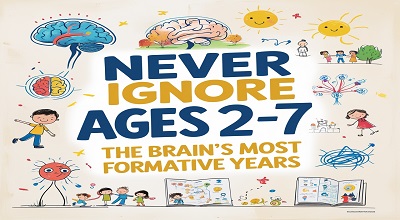The Brain’s Most Formative Years
The Brain’s Most Formative Years: The early years of a child’s life, particularly between ages 2 and 7, are a critical period for brain development. During this time, the brain undergoes rapid growth, forming neural connections at an astonishing rate. Research shows that nearly 90% of brain development occurs before the age of 5, making this phase essential for cognitive, emotional, and social growth.
In this comprehensive guide, we’ll explore why ages 2-7 are so pivotal for brain development, the science behind early childhood learning, and how parents and educators can support this crucial stage.
The Science Behind Brain Development in Early Childhood
Neuroplasticity: The Brain’s Ability to Adapt
Neuroplasticity refers to the brain’s remarkable ability to reorganize itself by forming new neural connections. During early childhood, the brain is highly plastic, meaning it can adapt quickly to new experiences, learning, and environmental influences.
Synaptic Pruning: Strengthening Important Connections
Between ages 2 and 7, the brain undergoes synaptic pruning—a process where weaker neural connections are eliminated while stronger ones are reinforced. This helps children develop essential skills like language, problem-solving, and emotional regulation.
The Role of Myelination in Cognitive Function
Myelination is the process by which nerve fibers are coated with a fatty substance called myelin, improving the speed and efficiency of neural communication. This process is crucial for developing memory, attention, and reasoning skills.
Key Developmental Milestones Between Ages 2-7
Language and Communication Skills
- Ages 2-3: Rapid vocabulary expansion, simple sentences.
- Ages 4-5: Complex sentences, storytelling abilities.
- Ages 6-7: Reading and writing skills develop significantly.
Motor Skills and Physical Development
- Fine motor skills (holding a pencil, using scissors).
- Gross motor skills (running, jumping, balancing).
Social and Emotional Growth
- Understanding emotions (empathy, sharing).
- Developing friendships and cooperative play.
How Early Experiences Shape the Brain?
The Impact of Positive and Negative Environments
- Positive reinforcement enhances learning.
- Chronic stress (e.g., neglect or trauma) can impair brain development.
The Role of Play in Learning
- Unstructured play boosts creativity and problem-solving.
- Games and puzzles enhance cognitive flexibility.
Nutrition and Brain Health
- Omega-3 fatty acids (found in fish, nuts) support brain function.
- Iron and zinc deficiencies can hinder cognitive growth.
The Importance of Early Education
How Preschool and Kindergarten Influence Development
- Structured learning environments improve school readiness.
- Social interaction in early education builds emotional intelligence.
Best Teaching Strategies for Young Children
- Hands-on, experiential learning.
- Incorporating storytelling and visual aids.
The Role of Parents in Early Learning
- Reading daily to children enhances language skills.
- Encouraging curiosity through questions and exploration.
Common Myths About Early Brain Development
1: Myth: “Intelligence is Fixed at Birth”
- Intelligence is shaped by experiences and environment.
2: Myth: “More Screen Time Equals Faster Learning”
- Excessive screen time can delay language and social skills.
3: Myth: “Only Academic Learning Matters”
- Emotional and social skills are equally important for success.
How to Support Brain Development in Children Ages 2-7
Encouraging Curiosity and Exploration
- Provide open-ended toys (blocks, art supplies).
- Allow safe risk-taking (climbing, experimenting).
Reading and Storytelling for Cognitive Growth
- Daily reading improves vocabulary and comprehension.
- Interactive storytelling boosts imagination.
The Power of Music and Art in Brain Development
- Music enhances memory and math skills.
- Art fosters creativity and fine motor control.
FAQs About Early Childhood Brain Development
1. Why are the first seven years so important for brain development?
The brain forms critical neural connections during this period, laying the foundation for future learning and behavior.
2. How can parents stimulate brain development in toddlers?
Through interactive play, reading, and providing a nurturing environment.
3. Does screen time affect brain development in young children?
Excessive screen time can reduce attention spans and delay language development.
4. What foods boost brain development in early childhood?
Foods rich in omega-3s (salmon, walnuts), iron (spinach, lean meats), and antioxidants (berries).
5. How does early stress impact a child’s brain?
Chronic stress can impair memory, emotional regulation, and cognitive function.
Conclusion
Ages 2-7 are a transformative period for brain development, shaping a child’s future learning, behavior, and emotional health. By understanding the science behind early brain growth and implementing supportive strategies, parents and educators can help children reach their full potential.
